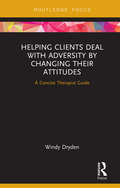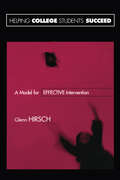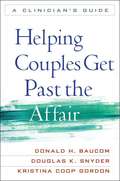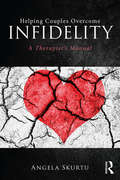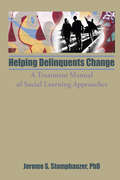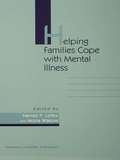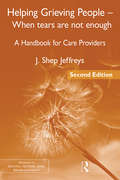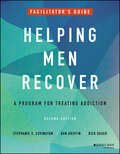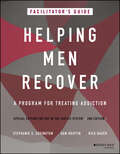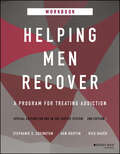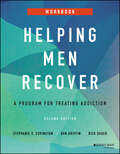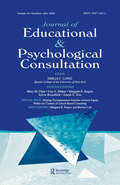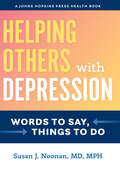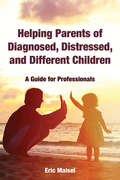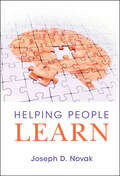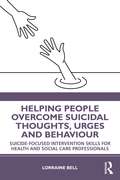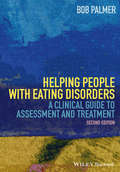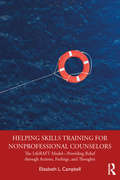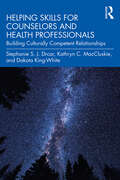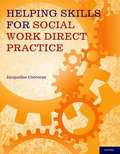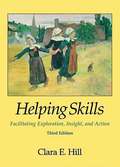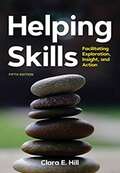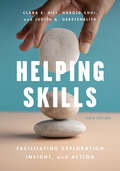- Table View
- List View
Helping Clients Deal with Adversity by Changing their Attitudes: A Concise Therapist Guide (Routledge Focus on Mental Health)
by Windy DrydenHelping Clients Deal with Adversity by Changing Their Attitudes: A Concise Therapist Guide provides an outline for therapists wishing to help clients deal with life’s adversities by encouraging them to change their attitudes. Divided in two parts, this book first provides a thorough, but concise, introduction to attitude-based approach to therapy, then applies these ideas to therapy. By redefining established concepts of ‘rational’ and ‘irrational’ beliefs in terms of the ‘rigidity’ and ‘extremity’ of client attitudes, Professor Dryden puts forward a language and an approach that is more acceptable to both clients and therapists. Helping Clients Deal with Adversity by Changing Their Attitudes will be a great asset to clinical and counselling psychologists, counsellors, and psychotherapists as well as trainees in these areas. It will be particularly of interest to CBT practitioners and students who do not cover REBT in their training, but are looking for a concise guide to how its attitudinal focus can be understood and applied in clinical practice.
Helping College Students Succeed: A Model for Effective Intervention
by Glenn HirschGlenn Hirsch offers professionals a user-friendly, comprehensive resource book of theories and specific techniques that can be used to enhance college student success. Dr. Hirsch offers readers an integrated model for change that includes both holistic assessments of academic difficulty and suggestions for three different levels of intervention based on the student's readiness and motivation for change. He also provides specific interview and testing strategies for determining the causes of academic difficulty.
Helping Couples Get Past the Affair
by Donald Baucom Douglas SnyderFrom leading marital therapists and researchers, this unique book presents a three-stage therapy approach for clinicians working with couples struggling in the aftermath of infidelity. The book provides empirically grounded strategies for helping clients overcome the initial shock, understand what happened and why, think clearly about their best interests before they act, and move on emotionally, whether or not they ultimately reconcile. The volume is loaded with vivid clinical examples and carefully designed exercises for use both during sessions and at home.
Helping Couples Overcome Infidelity: A Therapist's Manual
by Angela SkurtuHelping Couples Overcome Infidelity provides clinicians with tangible, research-oriented intervention strategies that can guide couples through the aftermath of an affair. In the treatment of an affair, there are several key elements that couples need to work through as a team, including assessment, working through the crisis phase, rebuilding trust, acknowledging the pain infidelity causes, repairing relationship issues, creating a dynamic sex life, choosing to stay in or leave the relationship, and forgiveness. This book will cover nine milestones in detail and offer a framework for how clinicians can offer helpful treatment at each step. Also included are case studies of particularly challenging couples that the author has worked with and a section at the end of each chapter on therapist self-care.
Helping Delinquents Change: A Treatment Manual of Social Learning Approaches
by Jerome Beker Jerome StumphauzerHelping Delinquents Change sets before itself a formidable task--that of removing the mystery from the understanding of delinquent behavior. Jerome Stumphauzer offers direct, useful means to work toward altering delinquent behavior. Abandoning an orientation to delinquency that focuses on punishment or medical models, Stumphauzer presents a view of delinquency that emphasizes the learning of adaptive, prosocial behavior, and provides to the youths themselves an opportunity to become engaged in selecting their own goals and methods for changing their behavior. The nondelinquent is presented as an example from whom to learn. The text is nontechnical and useful for students and practitioners alike. The book in intended expressly for those who work directly with delinquents--counselors, teachers, therapists, probation officers, those working in junvenile corrections, and for students of delinquent behavior in psychology, sociology, criminology, and education. Tables, diagrams, references, and indices supplement the text. Helping Delinquents Change is available for classroom adoption. Undergraduate and graduate students in criminology, psychology, counseling, education, and sociology are the primary audience. The book is particularly well-suited as a training manual or supplementary text and an instructor&’s manual is included.
Helping Families Cope With Mental Illness
by Harriet P Lefley Mona WasowIn this age of spiraling health care costs, it is imperative that the family's role in treating patients with chronic mental illness not be overlooked - by policy makers and clinicians alike. The families themselves insist that the government and care-providing agencies learn new ways to relate to them and patients. Helping Families Cope with Mental Illness is a comprehensive guide to the family's experience of chronic and serious mental illness for clinicians and educators in a wide range of mental health disciplines. It details all major areas of the clinician-family relationship - consumer perspectives, cultural diversity, social policy, ethical issues, practical coping strategies, research and training issues, major service issues, managed care, and cost-saving measures.
Helping Grieving People – When Tears Are Not Enough: A Handbook for Care Providers (Series in Death, Dying, and Bereavement)
by J. Shep JeffreysHelping Grieving People – When Tears Are Not Enough is a handbook for care providers who provide service, support and counseling to those grieving death, illness, and other losses. This book is also an excellent text for academic courses as well as for staff development training. The author addresses grief as it affects a variety of relationships and discusses different intervention and support strategies, always cognizant of individual and cultural differences in the expression and treatment of grief. Jeffreys has established a practical approach to preparing grief care providers through three basic tracks. The first track: Heart – calls for self-discovery, freeing oneself of accumulated loss in order to focus all attention on the griever. Second track: Head – emphasizes understanding the complex and dynamic phenomena of human grief. Third track: Hands – stresses the caregiver's actual intervention, and speaks to lay and professional levels of skill, as well as the various approaches for healing available. Accompanying these three motifs, the Handbook discusses the social and cultural contexts of grief as applied to various populations of grievers as well as the underlying psychological basis of human grief. Throughout the book, Jeffreys presents the role of the caregiver as an Exquisite Witness to the journey of grief and pain of bereaved family and friends, and also to the path taken by dying persons and their families. The second edition of Helping Grieving People remains true to the approach that has been so well received in the original volume. It includes updated research findings and addresses new information and developments in the field of loss, grief and bereavement.
Helping Grieving People: When Tears Are Not Enough
by J. Shep JeffreysHelping Grieving People -When tears are not enough is a handbook for care providers who provide service, support and counseling to those grieving death, illness, and other losses. This book is also an excellent text for academic courses as well as for staff development training. The handbook discusses the social and cultural contexts of grief as applied to various populations of grievers as well as the underlying psychological basis of human grief. Throughout the book, Jeffreys presents the role of the caregiver as an Exquisite Witness to the journey of grief and pain of bereaved family and friends, and also to the path taken by dying persons and their families. The second edition of Helping Grieving People remains true to the approach that has been so well received in the original volume. It includes updated research findings and addresses new information and developments in the field of loss, grief and bereavement.
Helping Male Survivors of Sexual Violation to Recover: An Integrative Approach - Stories from Therapy
by Sarah Van GoghPlacing the experiences of men at the heart of this book, Sarah Van Gogh outlines an integrative approach to effective therapeutic treatment of male sexual abuse. In a culture where to be male is often to be expected to embody strength, power and being in control, male victims of sexual abuse can be particularly challenging to help. This book outlines seven composite detailed case studies representing men from a wide range of backgrounds and demographics. It lays out how the author's pioneering model of an integrative approach which includes psychodynamic, humanistic, relational, cognitive/behavioural, body-based and arts-based approaches can offer an effective model for working with this client group. This key text provides a valuable resource for all those working with male survivors of sexual abuse.
Helping Men Recover: A Program for Treating Addiction, Facilitator's Guide
by Stephanie S. Covington Dan Griffin Rick DauerAN INSIGHTFUL, EFFECTIVE, AND PARTICIPANT-FRIENDLY APPROACH TO ADDICTION RECOVERY Now in its second edition, Helping Men Recover: A Program for Treating Addiction is a comprehensive resource for drug and alcohol counselors, program administrators, and mental health professionals working in outpatient, residential, and community-based treatment centers. Presented in a twenty-one session format, the facilitator’s guide provides a step-by-step manual containing the theory, structure, and content required to run effective and therapeutic groups. Helping Men Recover, Second Edition offers: New research, language, and content that addresses the opioid addiction crisis, LGBTQ+ inclusivity, male body image, and other issues Four modules that address the self, relationships, sexuality, and spirituality, all of which are areas that recovering men have identified as triggers for relapse and as necessary for growth and healing User-friendly and self-instructive materials designed to put participant and facilitator focus on the therapeutic process Three additional sessions with new exercises An essential update to a best-selling work in the field of addiction treatment, Helping Men Recover cements this text’s position as the go-to manual for men’s addiction and delivers a gender-responsive and trauma-informed treatment program ideal for practitioners everywhere.
Helping Men Recover: A Program for Treating Addiction, Special Edition for Use in the Justice System, Facilitator's Guide
by Stephanie S. Covington Dan Griffin Rick DauerAN INSIGHTFUL, EFFECTIVE, AND CONTEMPORARY APPROACH TO ADDICTION TREATMENT FOR THOSE WHO ARE IMPACTED BY THE JUSTICE SYSTEM In the newly revised second edition of Helping Men Recover: A Program for Treating Addiction, Special Edition for Use in the Justice System, a team of experts delivers a practical and straightforward framework to assist men struggling with substance use disorders. Targeting the four areas most consistently identified by men as triggering relapse—the self, sexuality, spirituality, and relationships—this therapeutic program has twenty-one sessions and explores topics like self-awareness and identity, the impact of family, abuse and trauma, communication, male socialization, and many more. Readers will also find: Three additional sessions with new exercises Comprehensive strategies for the creation of safe spaces in which men will feel comfortable expressing themselves, reflecting, and learning Information about how men experience and recover from addictions and trauma Ways to develop and learn teach the skills men need to maintain and sustain recovery from substance use disorders and live the life they want to live An indispensable collection of exercises and other resources for men in the criminal justice system who are struggling with substance misuse. Helping Men Recover belongs on the bookshelves of social workers, clinicians, and other correctional system professionals.
Helping Men Recover: A Program for Treating Addiction, Special Edition for Use in the Justice System, Workbook
by Stephanie S. Covington Dan Griffin Rick DauerEffectively treat men suffering from addiction and involved in the criminal justice system In the freshly updated second edition of Helping Men Recover: A Program for Treating Addiction, CJS Workbook, a team of dedicated practitioners delivers supplementary resources and tools designed to apply the principles and concepts discussed in the companion Helping Men Recover: A Program for Treating Addiction. The included materials were specifically created to assist men involved in the criminal justice system and can help to treat men at any stage of the criminal process. The Workbook addresses every facet of addiction, from the self to relationships, sexuality, and spirituality, and offers men the ability to process and record the therapeutic experience.
Helping Men Recover: A Program for Treating Addiction, Workbook
by Stephanie S. Covington Dan Griffin Rick DauerAn essential workbook for practitioners treating men with substance use disorders and addiction issues In the second edition of Helping Men Recover: A Program for Treating Addiction, Workbook, a team of distinguished practitioners delivers effective resources and tools to accompany their step-by-step guide to treating substance use disorders in men. The provided templates, questions, exercises, and other resources address four areas, including the self, relationships, sexuality, and spirituality, and allow men to process and record the therapeutic experience as they move through it. This new Workbook presents new exercises to use in group sessions, informational summaries, and insightful individual reflection questions and activities that clients can use following group sessions.
Helping Nonmainstream Families Achieve Equity Within the Context of School-Based Consulting: A Special Double Issue of the Journal of Educational and Psychological Consultation
by Bernice Lott Margaret R. RogersFirst Published in 2005. Routledge is an imprint of Taylor & Francis, an informa company.
Helping Others with Depression: Words to Say, Things to Do (A Johns Hopkins Press Health Book)
by Susan J. NoonanA comprehensive guide to how family members and friends can help someone who has depression.Mood disorders such as depression and bipolar disorder are biologic conditions of the mind and body that affect our everyday functioning, thoughts, feelings, and actions. Often devastating to the person, mood disorders can also be overwhelming to their family and close friends, who are frequently the first to recognize the subtle changes and symptoms of depression and the ones who provide daily support. Yet many feel unsure about how to help someone through the course of this difficult and disabling illness. This book is written for them.In Helping Others with Depression, Dr. Susan J. Noonan speaks firsthand from her perspective as a physician who has treated many patients, as a mental health Certified Peer Specialist, and as a patient with personal experience in living with the illness. Her combined professional and personal experiences have enabled her to write an evidence-based, concise, and practical guide to caring for someone who has depression or bipolar disorder, including men, women, teens, and seniors. In this compassionate book, Dr. Noonan • describes effective communication and support strategies to use during episodes of depression• combines sample narratives with concrete suggestions for what to say and how to encourage and support a loved one• offers essential advice for lifestyle interventions, finding appropriate professional help, shared decision making, and paying for treatment• helps readers understand how to navigate difficult situations, such as a loved one refusing treatment or grappling with suicidal thoughts • explains how caring for a person with a mood disorder creates unique challenges—and how to address those challenges• explores how concerned loved ones can use mobile applications and other technology to help• focuses on different populations, including teenagers, older adults, and people with substance abuse issuesShe also covers ways to model resilience, explains the concept of recovery—while describing what recovery looks like—and explores how caregivers can and must care for themselves. Featuring tables, vignettes, and sidebars that convey information in an accessible way, as well as comprehensive references, resources, and a glossary, this companion volume to Dr. Noonan's patient-oriented Take Control of Your Depression is an invaluable handbook.Praise for Other Books by Susan J. Noonan"This practical and compassionate handbook is perfectly suited to individuals living with depression: in accessible language, it offers firm, specific advice and quick cognitive tests and self-assessment metrics that even those in the deepest of doldrums will find helpful and relevant... Noonan's is a valuable volume for those suffering from depression, as well as for loved ones who are fighting the fight by their side."—Publisher's Weekly"This book offers useful insight for any health professional working within mental health... It is of enormous value to the layperson, hungry for knowledge about how best to interact and help their loved one face the dreadful ravages of depression."—Nursing Times
Helping Parents of Diagnosed, Distressed, and Different Children: A Guide for Professionals
by Eric MaiselIn Helping Parents of Diagnosed, Distressed, and Different Children, Eric Maisel provides clinicians with the tools they need to address the issues facing the parents of diagnosed children. In these pages, mental health professionals will find tips for using the right language to guide families through situations such as sibling bullying and parental divorce, as well as guidelines for thinking critically about children’s mental health. Filled with hands-on resources including checklists and questionnaires, this valuable guide offers clinicians a set of strategies to help parents deal effectively with their child’s distress, regardless of the source.
Helping People Learn
by Joseph D. NovakEducational theory and practice are historically influenced by the view of behavioral psychologists that learning is synonymous with behavior change. Helping People Learn argues for the practical importance of an alternate view, that learning is synonymous with a change in the meaning of experience. Based on the foundations of cognitive psychology and constructivist epistemology, this book presents a science of education that can guide the development of successful and meaningful educational programs. It serves as a sequel to the best-selling Learning How to Learn and includes ideas developed through the author's research and training programs conducted over the past thirty years. It emphasises the power of the knowledge representation tool 'concept maps', designed to facilitate meaningful learning and creativity. This book capitalises on the advances in technology and is of interest to students, professionals and researchers in educational psychology and learning theory.
Helping People Overcome Suicidal Thoughts, Urges and Behaviour: Suicide-focused Intervention Skills for Health and Social Care Professionals
by Lorraine BellHelping People Overcome Suicidal Thoughts, Urges and Behaviour draws together practical and effective approaches to help individuals at risk of suicide. The book provides a framework and outlines skills for anyone working with adults who present with suicidal thoughts or intent. Part 1 introduces a basic understanding of our knowledge about suicide and UK policy; Part 2 outlines the research into the treatment of suicidality and the general principles for working in the safest possible way. Part 3 outlines ten key psychological skills in the context of evidence-based best practice. The book also discusses the role of health and social care professionals in the prevention of suicide in the context of Covid-19. The book will be a valuable addition to the resources of professionals including psychotherapists, nurses, social workers, occupational therapists, prison and probation officers, drug and alcohol workers, general practitioners and support staff in any health or social care context.
Helping People with Eating Disorders
by Bob PalmerUp-to-date and accessible, the second edition of Helping People with Eating Disorders is a comprehensive guide to understanding, assessing, and treating eating disorders. Focuses on evidence-based practice with references to the latest research and new DSM-V classifications Discusses the types of eating disorders and their causes, reviews treatment methods and their outcomes, and provides guidance on dealing with challenging cases Illustrates concepts and methods using several case studies that run throughout the book, as well as many examples from the author's clinical work Written in clear and concise language by an expert with over 40 years' experience in the field
Helping Skills Training for Nonprofessional Counselors: The LifeRAFT Model—Providing Relief Through Actions, Feelings, and Thoughts
by Elizabeth L. CampbellHelping Skills Training for Nonprofessional Counselors provides comprehensive training in mental health first aid. Through a trusted approach, grounded in evidence-based psychological research and counseling theory, this training manual provides step-by-step instruction in helping skills written exclusively for nonprofessionals. Focusing on the basics of nonprofessional counseling, the author has written an easy-to-read text that pinpoints strategies, action steps, and investigation procedures to be used by nonprofessionals to effectively aid those in distress. The LifeRAFT model integrates multi-theoretical bases, microskills training, evidence-based techniques, and instruction on ethical appropriateness. It also includes case studies, session transcripts, and practice exercises. With undergraduate students in applied psychology and nonprofessional counselors being the primary beneficiaries of this text, it is also ideal for anyone seeking training to effectively respond to mental health crises encountered in their everyday lives.
Helping Skills for Counselors and Health Professionals: Building Culturally Competent Relationships
by Kathryn C. MacCluskie Stephanie S. Drcar Dakota King-WhiteHelping Skills for Counselors and Health Professionals provides a model of foundational helping skills that is grounded in a multicultural framework. Chapters explicitly examine implicit bias and the role of culture and systems of oppression and marginalization within the lives of both individuals and communities. The text also uses ecological systems theory to assist readers in conceptualizing the ways in which culture influences communication styles, perceptions of professional helpers, and individual needs. Readers will be introduced to concepts that increase awareness of micro and macro-level influences on helping skills, communication, and the patient’s life. Within the book’s multicultural framework, readers will also find tools for increasing self-awareness for improving the communication skills and cultural humility.
Helping Skills for Social Work Direct Practice
by Jacqueline CorcoranDirect practice foundation courses in social work prepare students for every step of the problem-solving process, yet too often emphasize the what and the why of practice at the expense of the how. This practical, easy-to-use, and hands-on guide bridges this gap by illustrating the helping skills that practitioners can actually use to influence people's lives in positive ways. Integrating two major helping models -- motivational interviewing and solution-focused therapy -- it equips students with the techniques and skills necessary for activating client strengths throughout the problem-solving process. Helping Skills for Social Work Direct Practice presents a wealth of sample dialogue, exercises, tips, and do's and don'ts, all designed to encourage learning by doing. This workbook helps make the links between theory and practice.
Helping Skills: Facilitating Exploration, Insight, and Action
by Clara E. HillWith this third edition of Helping Skills, respected clinician and researcher Clara Hill has revised and updated her popular textbook, continuing her comprehensive exploration of basic helping skills for undergraduate and first-year graduate students. Following Hills well-established three-stage model of helping (Exploration, Insight, and Action), the text presents an integrative approach that is grounded in client-centered, psychoanalytic, and cognitive behavioral theory. Hills model recognizes the critical roles of affect, cognition, and behavior in the process of change, filling a void left by textbooks that focus more narrowly on the processes facilitating change. The text includes many student-friendly features and provides in-depth information on: the theoretical foundation of the three-stage model of helping the different goals used in each stage (e. g. , attending and listening, restatement, challenge, self-disclosure, and feedback) the general principles of ethical conduct and strategies for resolving ethical dilemmas numerous practice exercises, labs, and Web forms that illustrate (and help evaluate) the complex interaction between client and helper how students can intervene most effectively from moment to moment, based on their intentions and the clients reactions New material for this edition includes: a revised approach to the three-stage model, emphasizing goals and tasks of the stages and the ability to traverse among the stages in a helper-client relationship more attention to multicultural issues and better delineation of steps of the Action stage for four discrete tasks (relaxation, behavioral change, behavioral rehearsal, and decision-making) With her accessible yet instructive style, Hill instills enthusiasm for the process of learning to help others. She also encourages students personal and professional growth with questions that challenge them to think about and discuss the process of becoming helpers
Helping Skills: Facilitating Exploration, Insight, and Action
by Clara E. HillIn this fifth edition of her best‑selling textbook, Clara Hill presents an updated model of essential helping skills for undergraduate and first‑year graduate students. Hill’s model consists of three stages—exploration, insight, and action—in which helpers guide clients in exploring their thoughts and feelings, discovering the origins and consequences of maladaptive thoughts and behaviors, and acting on those discoveries to create positive long‑term change. <p><p> This book synthesizes the author’s extensive clinical and classroom experience into an easy‑to‑read guide to the helping process. Aspiring helping professionals will learn the theoretical principles behind the three‑stage model and fundamental clinical skills for working with diverse clients. Hill also challenges students to think critically about the helping process, their own biases, and what approach best aligns with their therapeutic skills and goals. <p><p> New to this edition are detailed guidelines for developing and revising case conceptualizations, expanded coverage of cultural awareness, updated case examples that reflect greater diversity among clients and helpers, and additional strategies for addressing therapeutic challenges.
Helping Skills: Facilitating Exploration, Insight, and Action
by Clara E. Hill Harold Chui Judith A. GerstenblithThe sixth edition of this seminal textbook offers an updated model for aspiring helping professionals to enhance their clinical skills. Significant updates to this edition include: new interactive features to improve student learning, including self-reflection exercises to help them cultivate their own values and perspectives as helpers and role-play activities for hands-on learning; updated case examples and reflection questions that reflect a broad range of diversity among clients and providers; a shift from a stage-based model to a more fluid, goal-based model of helping skills; and empirical updates that help students understand the importance of tailoring interventions to clients&’ individual needs. Clara Hill&’s helping skills model consists of three main goals—exploration, insight, and action—in which helpers guide clients in exploring their thoughts and feelings, discovering the origins and consequences of maladaptive thoughts and behaviors, and creating positive long‑term change. This easy-to-read guide synthesizes Hill&’s extensive clinical and classroom experience with fresh, unique insights from coauthors Harold Chui and Judy Gerstenblith. They teach fundamental theory and provide students with clinical skills, challenge them to think critically about the helping process, and enable them to develop their own unique approach to helping clients.
